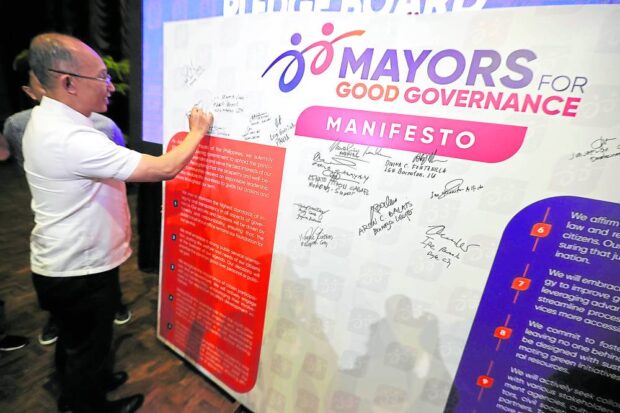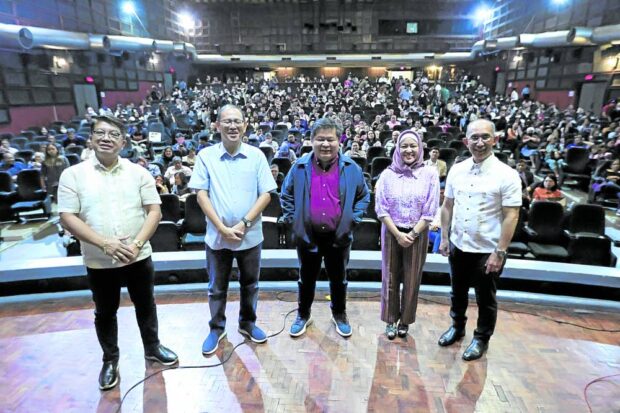Anti-corruption drive pins hopes on mayors

LONELY CRUSADE? Baguio City Mayor Benjamin Magalong hopes that more than a few good men and women, starting in local government, will heed the call for honesty, transparency and accountability. (Photo by GRIG C. MONTEGRANDE / Philippine Daily Inquirer)
MANILA, Philippines — A movement for good governance against corruption in local governments is stirring to life and has already received support from around 150 city and municipal mayors in Luzon, Visayas, and Mindanao since it was launched late last week.
Muntinlupa City Mayor Ruffy Biazon on Saturday told the Inquirer that he had signed the mayors’ manifesto committing themselves to a 10-point guide to taking action and making decisions that are “driven by honesty and accountability, ensuring that the public’s trust in our office remains our foundation for our service.”
Biazon, who is serving the first year of his first term as mayor at 54, said that the statement aligned with his own “principle, programs and agenda” when he ran for office last year.
“It spoke about integrity and accountability in the performance of duty, commitment to upholding citizen participation and inclusivity, particularly of the youth, upholding the rule of law and responsible management of government resources and introducing innovation and technology in governance, among other things,” said Biazon, a former congressman.
He said the lead convenors of the movement, including the outspoken Baguio City Mayor Benjamin Magalong, were expected to invite or recruit other local chief executives into the Mayors for Good Governance (M4GG) movement.
Article continues after this advertisementThere are 148 cities and 1,486 municipalities across the country. The manifesto, which was printed on a large tarpaulin and signed by the mayors at the launching of the movement on Aug. 24 at the University of the Philippines Film Center, urged local officials to “maintain the highest standards of integrity and transparency in all aspects of governance.”
Article continues after this advertisementMagalong lead
Magalong, 62, a retired senior police official, has started his own anti-corruption campaign in Baguio.
In a speech last month, he lamented that corruption has become the “norm” in the country and that only a few members of Congress “raised hell” after learning that despite the national debt ballooning to over P13 trillion some officials were still getting a “percentage” off government projects.
Quezon City Mayor Joy Belmonte said that as a good governance advocate, she quickly agreed to join Magalong and the others.
In an interview with ABS-CBN, Magalong said the mayors will hold “small group discussion” on “how to move forward.”
“We will have to define our mission, vision, what our plan of action will be,” he said. “If we grow, it will be an overarching movement.”
Magalong said that at the moment, “anybody can join” the movement but they will “set a criteria” for those who would be invited.
146 so far
“We assume that there is something good in people, people change and since there is a manifesto to sign, so they have to adhere to prescribed set standards. We also should have a filtering,” he said.
The other lead convenors of the movement who had signed the manifesto are Belmonte, Marikina City Mayor Marcelino Teodoro, Dumaguete City Mayor Felipe Remollo, Isabela City Mayor Sitti Hataman and Kauswagan Mayor Rommel Arnado.
As of Saturday, there were 146 mayors who had signed the manifesto — 82 from Metro Manila and Luzon, 37 from Visayas and 27 from Mindanao.
Those who had signed included Pasig City Mayor Vico Sotto, Makati City Mayor Abby Binay, Taguig City Mayor Lani Cayetano, Pasay City Mayor Imelda Calixto-Rubiano, Iloilo City Mayor Jerry Treñas and Cebu City Mayor Mike Rama.
The two-page manifesto commits the mayors to, among others, the rule of law, responsible leadership, transparency, prudent fund management, citizen participation and empowerment, and youth development.
“We shall embrace a strong public service orientation, putting the welfare and needs of our citizens at the forefront of our agenda. Our decisions will prioritize the common good over personal or political gain,” the manifesto said.

PRIME MOVERS | A new campaign to promote good governance and stamp out corruption in local governments was launched on Aug. 24 with an assembly of dozens of mayors at the UP Film Center on the Diliman campus led by its prime movers that included (L-R) Kauswagan Mayor Rommel Arnado, Marikina City Mayor Marcy Teodoro, Dumaguete City Mayor Ipe Remollo, Isabela de Basilan Mayor Sitti Hataman and Baguio City Mayor Benjamin Magalong. (Photo by GRIG C. MONTEGRANDE / Philippine Daily Inquirer)
Why still only a few?
In his speech at the launching of the movement, Magalong noted that only a relatively small number of mayors out of more than 1,600 nationwide had signed their manifesto.
“Why? Why are there only a few who signed up for the Mayors for Good Governance?” he asked.
There may be “several factors,” such as a lack of awareness about their movement and “big pressure” on the local executives.
“And third, is because they are not willing to give up the perks and privileges. Why? It can be summarized with the acronym MAP — Masarap Ang Pera,’” Magalong said.
“The reason why we are here is because we love our country,” he said. “We want to raise awareness of the evils of corruption … no less than the people themselves demand good governance.”
“It will be tough,” he added. “But we are not going to give up because if we abandon the cause, it is as if we have given up for the future of our kids, the future of our children, the children of our children, and the future of our nation.”
Magalong’s statements about corruption were supported by 115 retired and active military and police officers who were his fellow graduates from the Philippine Military Academy.
They said in their July 18 manifesto of support for Magalong that corruption was a “cancer that eats away at the progress, development and prosperity” and “a blight that hinders economic growth, undermines trust in our government institutions, and perpetuates inequality.”